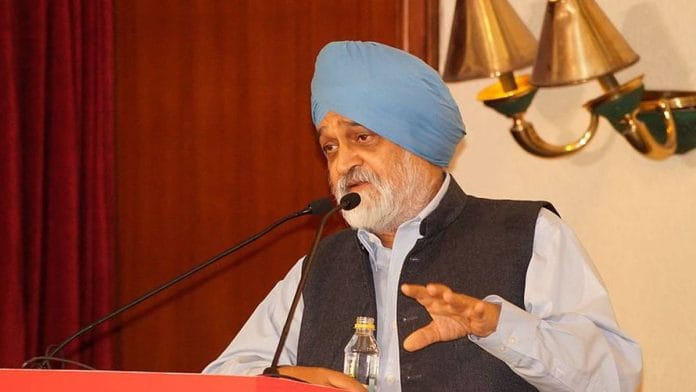New Delhi: State governments will need to take the “politically difficult” decision to stop subsidising electricity to certain consumers while overcharging others if India’s energy transition away from fossil fuels is to succeed, economist Montek Singh Ahluwalia said in a presentation Monday.
Ahluwalia was speaking at a seminar on managing climate change in India, organised by the Centre for Social and Economic Progress in Delhi, where the discussion addressed the measures India would need to take to achieve net-zero emissions by 2070. The event was also attended by former BJP national general secretary Ram Madhav, who said the Indian government should rise to the global climate challenge, be more ambitious, and not espouse a ‘third world mentality’ about acting only after the west.
“You can’t continue a system where certain favored consumers get electricity free, both farmers and low-income consumers. That burden is shifted onto industry, and then they start demanding Production Linked Incentive (PLI) support,” Ahluwalia said, adding, “Instead of directly subsidising electricity, we’re cross subsidising by charging too much from industry, who are then asking for PLI support. It’s a contradiction in terms.”
Achieving net-zero carbon emissions by 2070 will involve large-scale transformation across every sector — from building to transport — said Ahluwalia, as well as reform in power distribution companies. According to him, introducing a carbon tax is a way to catalyze that change.
“There should be a carbon tax. It’s difficult to do. Countries that have a much better public understanding are failing to do it. If we introduced a carbon tax, a lot of the problems of switching to new technology would be virtually automatic, and the revenues could be used to help people who are dependent on coal,” said Ahluwalia.
He added: “In the absence of carbon tax, what is being talked about, is some kind of cap and trade system. I personally do not think it’s the best.”
The Indian government last year passed a legislation to introduce a national-level carbon market, which will allow entities to sell carbon credits that they earn through reducing their own emissions.
At the COP27 climate summit in Egypt’s Sharm el-Sheikh last year, India presented its long-term strategy to achieve net-zero emissions by 2070, which includes plans to expand and stabilise the renewable electricity grid, phase down coal, increase the adoption of electric vehicles, research and development into carbon removal and capture technologies, as well as the restoration and conservation of forests.
In the short term, India has pledged to reduce its emissions intensity of gross domestic product (GDP) by 45 per cent below 2005 levels by 2030, as well as achieving 50 per cent cumulative electric power installed capacity from non-fossil fuel-based energy resources by the same year.
Also read: Climate change trauma is real. And it has a long-term impact on cognitive functioning
Unconventional ideas for energy transition
Ram Madhav meanwhile, praised the government’s MoU with Sri Lanka, to produce electricity through a hybrid wind system and supply it to India.
“Bhutan is ready with a 2000 MW hydro power plant. But no takers. It can only be taken by India, because that is the kind of friendship we have. We have the possibility of an alternative, but we are not taking it, because it does not concern India, it concerns another country,” Madhav said.
He added: “I think we should think in the regional context as well. Sectoral targets are also very important.”
Both Madhav and Alhuwhalia also toyed with unconventional ideas to address the energy transition challenge ahead of India. Madhav suggested saving energy by introducing a new time zone in the northeastern states, where sunrise and sunset happen earlier than in the mainland. “This was discussed, but there were also discussions that this might become a political issue,” he said.
Ahluwalia put forward that larger states should be broken up, so that new city capitals can be made, easing the burden on existing ones as centres for urban development. By 2050, nearly 40 per cent of the Indian population is projected to live in urban centres, according to his estimates.
“We need to have more cities, because we cannot have the modern metropolitan cities expand. The only way you can get public support for a new city is if you create a new capital in a new state. In my view, many of our states are too big. It’s not a bad idea to split them up and create new states. When you create a state capital, many people will get together to do what is necessary.”
(Edited by Poulomi Banerjee)
Also read: Why Indian scientists are critiquing IPCC report — unfair burden on developing countries






